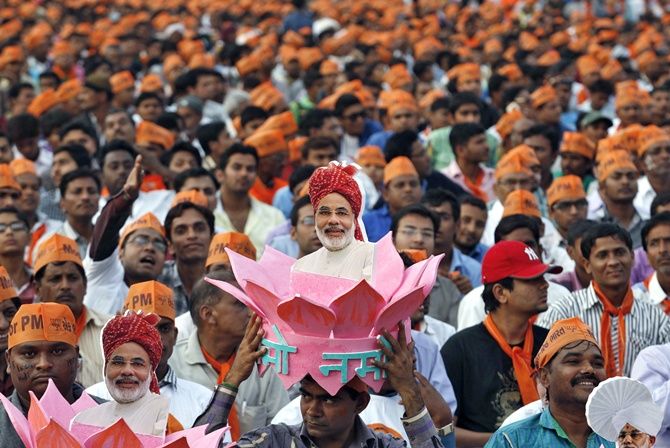Contrary to the bragging that marked its two-year anniversary, the government's timidity on reform is simply astounding, says Mihir Sharma.

There is little or no doubt in my mind that, since the beginning of 2016, there has been much energy, direction and purpose to this government than before.
A creditable, forward-looking Union Budget was presented, with relatively sober fiscal arithmetic; a bankruptcy law has been passed; work continues on de-clogging the infrastructure sectors, with varying degrees of success but considerable effort.
The process of bank consolidation and of bringing bad debt out into the open has begun; that is a prerequisite for a lending, investment and more general recovery.
Already, infrastructure spending and an air of activity has translated into a more positive attitude among businesses on the ground – which has been helped along by small but distinct signs of a demand and production revival.
These are all things to be proud of. They help lay the foundation for deeper, more important, and job-creating reform.
Or they would, in any government that cared less about headlines and more about the economy.
Under this government, however, these series of important but largely incremental steps are being sold as a vast transformation of India’s economy – which they are most emphatically not. (It is worth noting, however, that “Transforming India” seems to have replaced “Achhe Din” as the government’s achievement marker.
Wise – Acche Din was becoming a wry joke, and Transforming India, as opposed to, say, Shining India, does convey the idea of a process still in motion, that might take several terms to complete.)
Still: The “colourful booklets” (as the Press Information Bureau describes them), the non-stop tweets, the synchronised interviews with Cabinet ministers, the “Transforming India” videos, the phone subscribers inundated with unsolicited demands they download the “Transforming India” ringtone, all culminating in a five-hour extravaganza during which Prime Minister Narendra Modi spoke at an India Gate largely empty of people as if it were a football stadium – these come across as genuinely odd, given the context of the government’s limited ambition and achievements.
So noisy has the government’s defence of its decidedly mixed record been that the most charitable explanation is that they have missed the point.
For evidence, look no further than the recent interviews and speeches of the prime minister.
In a much-scrutinised interview to The Wall Street Journal in the run-up to the two-year extravaganza, Mr Modi provided a robust defence of his failure to privatise, and to push through reform of land and labour.
He said he could give “dozens” of examples of successes like the Jan-DhanYojana.
In his speech at India Gate, he said that programming about his successes could fill an entire week of Doordarshan, and not just five hours.
There may be, charitably put, some exaggeration involved here.
A fine piece of fact-checking in the web site Scroll points out that in his India Gate speech Mr Modi said that Rs 15,000 crore (Rs 150 billion) had been saved through plugging leakages in LPG connections; but, in fact, the number may be under Rs 150 crore (Rs 1.5 billion), and even the government’s Chief Economic Advisor has said that “potential savings”, not actual savings, were being calculated – a potential he estimated, in the Economic Survey, to be Rs 12,700 crore (Rs 127 billion) in the year.
There seem to be other contradictions – just over six million new LPG connections, not 30 million; 6.6 million deleted ration cards, not 16.5 million.
Some clarity would help here, as would some modesty.
But, most surprisingly, Mr Modi claimed to the Journal that no “expert” could “tell (him) clearly what was the ‘big bang’ they were looking for”.
This is puzzling, especially as Mr Modi then spends much of the rest of the interview answering questions about exactly the big bang reforms he is not carrying out.
Let us, for a moment, take Mr Modi’s claim at face value, and briefly repeat what it is that most “experts” conceive comprises “big-bang” reform.
First: privatise those businesses the government should not be in.
Air India is a national disgrace in terms of service quality, a bottomless sink for taxpayer rupees, and a constant source of undercutting and instability in the aviation sector.
MTNL and BSNL are also money sinks, and holdovers from a dim and distant past – MTNL recently refused to transfer my wife’s internet connection to the verdant New Delhi colony Nizamuddin East because “they couldn’t find a tree” to hang the cables off, after she stood in line for hours for a service request you should be able to put in online in seconds.
Dozens of other public sector units are a drain on public resources and on productive capacity.
Sure, Mr Modi is entitled to see parts of the public sector as vital to national development – many do – but these certainly are not.
Why are they not being sold? (And, incidentally – no, a banks board bureau is not a structural replacement for privatisation.)
Second: create a flexible labour market. With the first majority in 30 years, this government nevertheless repeats the tiresome talking points of those in the past – that labour law reform is subject to the unions’ approval, and that it must not be biased towards the employer – no matter that current labour law hurts employers and the larger labour force alike.
Mr Modi added a unique spin to the argument by saying that some states, which didn’t have much industry, didn’t even need labour law reform.
Umm, actually, they need it as much, if not more, than the others – inflexible labour markets, the fear that once you hire people you could be stuck even if your business plan goes bad, deters investment in industry in large parts of the country.
It is puzzling that nobody in his purportedly brilliant PMO has explained this to him.
But then, the PM dismissed “hire and fire” as a “Western concept”, not in keeping with our culture – which is, of course, under an RSS-leaning government, the kiss of death.
Some right-leaning think tank needs to promise a hefty cash prize to the first Sanskrit scholar who discovers something in the Puranas about flexible labour markets.
Third: Begin genuine administrative reform. The biggest thing holding back the Indian economy is the incapacity and inefficiency of the Indian state.
It needs to be reformed and streamlined. The blueprints have existed for years, nay decades.
Ministries need to become policy-making centres, not rule-making centres; independent agencies and regulators need to be empowered to make the rules instead; judicial and regulatory capacity needs be created through massive investment; lateral entry and accountability needs to be ensured at all levels of the bureaucracy; local government needs to be strengthened and given financial independence.
Merely taking processes online will not cut it, as the Brazilian experience shows.
Not only are these and other similar reforms not being carried out, they are not even being imaginedunder this babu-friendly administration.
Fourth: reform the Budget and expenditure mechanism. Make the Union Budget use accrual-based accounting instead of cash-based, so clever finance ministers – like, say, P Chidambaram – can’t hide and postpone expenditure to create better numbers.
Don’t use the promised medium-term fiscal framework as a way to simply ignore the existing fiscal consolidation road-map.
Cut the Union government out of the process of disbursing monies to the states for schemes that they are implementing and evaluating – if, that is, you are serious about “competitive co-operative federalism”.
Here, again, the steps taken are more backward than forward.
Contrary to its bragging, the government’s timidity on reform is simply astounding.
Consider the bankruptcy code, perhaps one of the only bright spots in its poor record of structural change.
The original draft was a masterwork, something rare in India – an interlocking vision for bankruptcy procedure that created an independent cadre of regulators and professionals.
The law that emerged from the Centre eventually was indubitably a big step forward – but was mysteriously missing crucial modernising elements like the tribunal infrastructure, the independence of the regulator, and the provisions governing the insolvency professionals.
In place of all these was increased discretion for existing government servants.
Some who defend “gradualism” say political pressures make big-bang reforms impossible in India. OK, so what were the political pressures in this case? None.
The sad fact is that, if Mr Modi could indeed claim qualified success if his government expands the processes started under the three previous administrations with regard to financial inclusion, natural resources management, and access to electricity. That plus efficient management plus an infrastructure build-out would be creditable enough, and many – including this writer – would praise him fulsomely for it.
But by simultaneously claiming that big-bang reforms did not exist, that they were impossible, and that he had already carried them out– all while expanding the reach of the state – the PM forces observers to take a critical and disbelieving stance.
Two years in, Mr Modi is certainly working on improving India – but transforming India is not even on the horizon yet.











